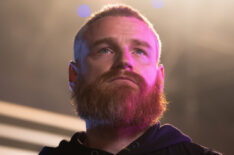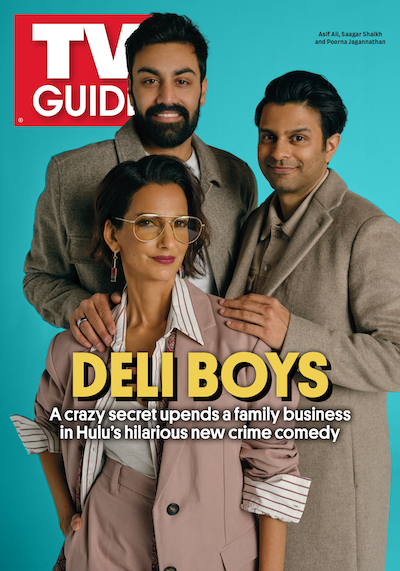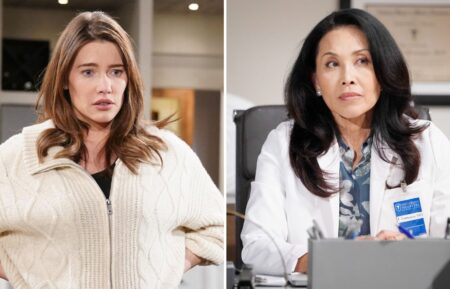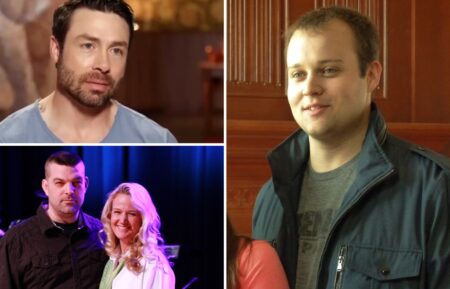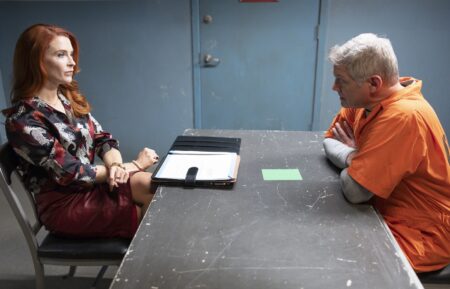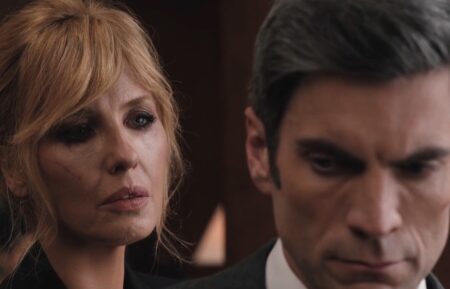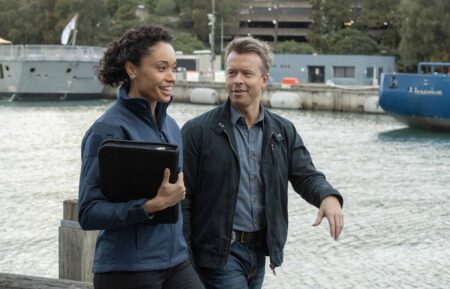‘The Challenge: USA’ Season 2 Winners Reveal Overnight Portion of Final You Didn’t See
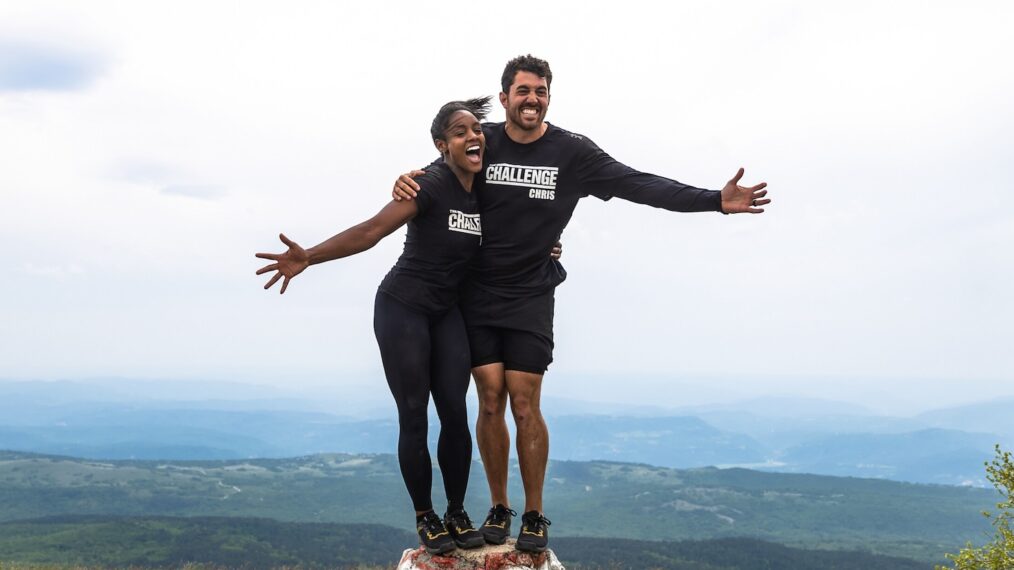
Q&A
So far, The Challenge: USA winners have been “Survivor strong,” between the first two seasons. In Season 1, it was Danny McCray and Sarah Lacina who were the only ones to finish the final. And now, in Season 2, Chris Underwood and Desi Williams each took home $250,000. “We’re just trying to keep the train rolling,” Underwood says.
It was a two-day final, the first of which consisted of trials that tested the players’ Strength, Smarts, Skills, and Steel Stomachs. The second was a 10-mile race, with a few challenges along the way. In the end, Underwood reached the flag first and Williams third (and first of the women).
Below, Underwood and Williams take us inside that final.
Desi, you were right about encore performances (her partner quit during the first leg of the USA Season 1 final), and Chris, you beat the people who targeted you. Now that you’ve had time to process, how does it feel to be Challenge winners?
Des Williams: I think it’s obviously a pinnacle. There was so much bubbling up Season 1 and then it was ripped from underneath me, so it was like a continuous build — the Season 1 build and then add on Season 2 — and to win… Obviously you saw the waterworks. I don’t know why I was such a crybaby this season, but you couldn’t help but cry because on one hand, it’s relief, and on another hand, it’s affirmation that you’re right where you’re supposed to be. I think Chris and I both had a lot of positive affirmations that we were doing in our head often —positive annihilation, whatever. I think we really had to overcome a mental component of the game. And to do that I think just really gives you strength that can translate to different aspects of your life.
Chris Underwood: It feels just incredible. I was over the moon finishing the way that I finished, screaming from the top of the mountain. Even outside of The Challenge, having two wins, going two for two with reality TV, I don’t know if there’s anyone else that’s done it twice in a row like this. And so I am really proud of myself, proud of my ability to keep my head in the game, so to speak, and stay resilient and be mentally tough. And a lot of that self-talk Desi was referring to came in handy for me on this season.
What did you both think of the final? Chris, this was your first, and Desi, you did the first leg last season.
Williams: I thought it was tough. Obviously I don’t have a full final to compare it to. There were parts that were left out, and I think there was a lot of footage that wasn’t shown or captured. I can say when I was running the final, I did not have any cameramen anywhere around me for most of it, probably 90 percent of it. I think there was a lot of uphill climbing and grueling runs that weren’t seen. There was an overnight challenge that wasn’t seen. But is it the toughest final The Challenge has ever seen? I don’t know, it’s debatable, but probably not.
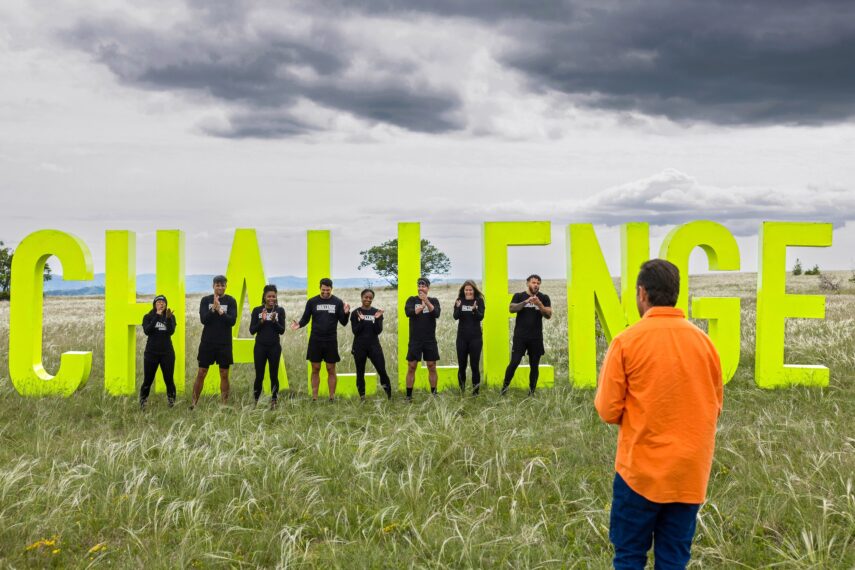
Jonne Roriz, courtesy of Paramount
Underwood: I expected it to be torture and extremely difficult, and it was all of that plus running uphill with a 30-pound rock for miles and on your shoulders in awkward, uncomfortable positions. It’s not like wearing a 30-pound backpack. It is completely different, and it takes a certain type of person to get to that point and to finish it even if you don’t win it. But just to finish that, that’s just really difficult to do. And like Desi said, may not be the hardest final that The Challenge has ever done, but it was definitely the hardest hike I’ve ever done in my life and probably will ever do for sure. It took a lot out of all of us, and so I’m really proud that we all got to that point and most of us finished the race. It was just a really, really cool experience.
Desi, what was the overnight challenge?
Williams: So you saw us making a fire and we were just chit-chatting around the fire and then it cut to Day 2. Actually, we chit-chatted for maybe 20 minutes, and then TJ walks out and tells us we have an overnight challenge. Essentially we each have our own individual 12-by-12 pillar we have to stand on — using our internal clock — for between 60 minutes and 65 minutes. If you go get off it before the hour mark, then you’ve got to do it again. If you stay on it past the hour and five minute mark, you have to do it again. So we stood on those pillars trying to count time for an accumulation of three hours and some change. First time, we were under. The second time, we were over. The third time, we were like, we either get this right or we’re going to be standing up here all night long. So the third time we finally got it right, we got to go to bed, and then a couple hours later, we’re woken up to run Day 2.
You both doubled down during the Smarts trial, and Desi, that worked out for you. For both of you, was that more confidence in that part, lack of confidence in others, or just a gamble?
Williams: For me, it was confidence in that part. I know I’m a decent speller. I didn’t know other people were such poor spellers. You think they’re going to ask you trick questions about trick words, and then they were all just regular words. But luckily, they’re not regular words to everyone else.
Underwood: Yeah, I did win a spelling bee in middle school, so I thought I was smooth sailing, but there was two separate words that I second guessed the initial word I’d written down, erased it from the board, changed it, and then got it wrong. So really when it comes to spelling, trust your gut and the first answer is probably the right answer.
What was the most challenging part of the final?
Williams: For me, it was just being dehydrated during the run. We had all vomited up everything day one; that eating trial was our last one. Then we stood on a pillar, so we didn’t really have time to rehydrate, refuel. I was just out of fuel by the end of it. So I was just running on fumes trying to get to the end. Literally at the top, you can hear me making the sounds of crying, but I had no tears coming out of my eyes because I was that dehydrated.
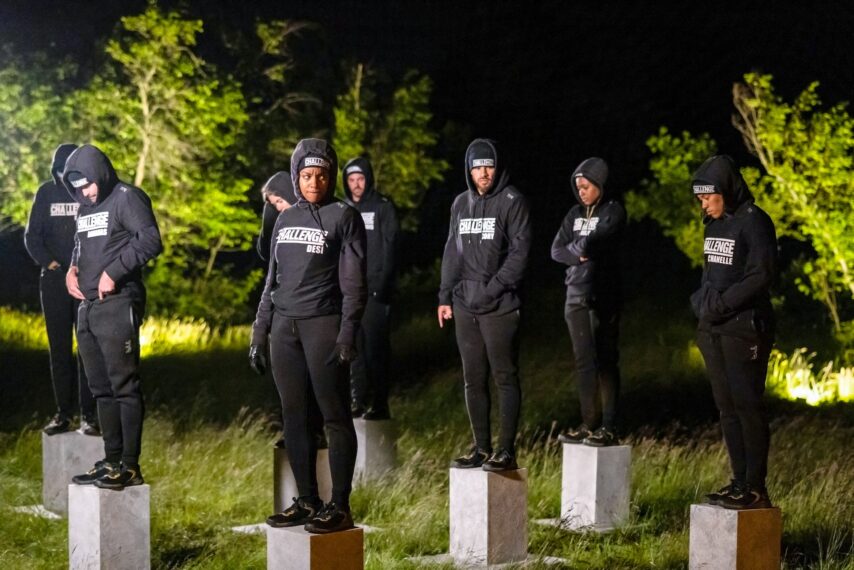
Jonne Roriz, courtesy of Paramount
Underwood: For me, it was the night challenge. Standing up on that column in the Croatian Highlands for hours on end counting second by second was torture. And the final day I had an out of body experience where pain was just a distant emotion. It was there, I just didn’t acknowledge it. The acknowledgement that I could be up there all night long, standing on this pillar before having to run 10 miles uphill, was difficult for sure.
At what point did you each have a feeling you could win?
Underwood: Before the race even started, I was like, “I’m going to win and when I pass the first place person, I’m going to keep going until my legs fall off. I’m going to beat them by 30 minutes if I can.” But it really sunk in that I was very far ahead after I had gotten the scale and was the first person to the ATV. I just literally didn’t look back.
Underwood: Yeah, one of my mantras from the beginning — I had these daily mantras — was, “If I’m not dead, I get to keep going. It’s a privilege that I am still alive, so I’m going to keep going.” So same thing as Chris: If my legs don’t fall off, I’m going to keep moving forward. But definitely when Michaela decided not to wait for that balance challenge, and then I passed her in the ATV and she was looking kind of tired — and I knew she was tired because we had done the climb with the rock together. There were moments of that where I was like, “Come on, Michaela, keep coming,” and vice versa, but I knew she was gassed. [That’s when] I was like, “I think this is mine. If I don’t die, I’m about to be $250,000 richer.”
Talk about stepping up to the only scale available when you and Michaela got there.
Williams: They go over the rules before we start. Not everybody listens to rules, but I’m a rule follower, so I listened. It was very clear that those were first come first serve. We all theoretically knew that if you were paying attention, so we run up to sign at the same time. First we have to read the sign aloud. Michaela stops to rest and said something along the lines of, “What do we do now?” I looked over at her and didn’t say anything. I just put my rock in the basket. I knew exactly what to do. She hesitated and I didn’t.
Would you have waited for a scale or started walking?
Williams: Oh, I would’ve waited for a scale. Yeah, no chance. I couldn’t carry that rock. First I thought I was going to have to keep carrying the rock if I didn’t do it, so that alone was enough of a deterrent.
Chris, you went into the arena quite a bit this season. It felt like you just kept being thrown back in there and you didn’t really have people on your side for a while there. Do you regret anything you did in terms of gameplay that led to that? Do you think there’s anything you could have done differently? Do you even care since you won?
Underwood: Yeah, I could have watched more seasons of The Challenge ahead of time and realized that the vet alliance transfers season after season and it would’ve been an impossible task for me to try to penetrate that alliance and be one of them from the beginning. That was a big reason that I was playing the middle and hoping that by proxy of being really close with Josh and being really close with Michele that I would be protected, so to speak, by Fessy and Cory, that they might want to go after other rookie males before me. Same thing on the Survivor side, that they were targeting other bigger vets than turning their back on me. But once I realized that Michele and Josh had different agendas than what I had perceived, what we were doing, and then Desi just couldn’t stick her neck out for me, I just realized I was on an island, only the person getting me out of this s**t storm was me.
And then as it goes in The Challenge, it’s so easy to continue to throw someone in once they’ve already gone in once or twice, if they don’t have any good footing. That’s a big reason why Cassidy, once she was in, continued to be; no one wanted to go to bat to try to get her out of that position, and the same was for me. So I had to win dailies or win eliminations to make it to the final.
Would you do another season of The Challenge? Another USA season? An MTV one?
Williams: I think for both of us, everything has to align perfectly, right? I’ve got a job, I’ve got a business that I own and have to run day in and day out. So it’s a big sacrifice to leave and you have to trust that things will stay stable at home while you disappear and are kind of unreachable for weeks. I won’t say never. I think the MTV version is unlikely mainly because of the time commitment. We filmed for seven weeks for USA. I think they film for 12 or 13. You’d have to pay me a lot of money, honestly, a crazy amount that they’re not going to pay. So maybe another USA, I don’t know about MTV.
Underwood: Same boat for me. I make a lot of sacrifices coming out here and depend on others to kind of pull my weight, and it’s not necessarily fair to do that season after season. I’m not 25, single, living in a bachelor pad and doing The Challenge every time I get a call. So it would have to be an all winners type thing for me to say yes to come back or the timing would just have to be right. So I would say the probability of me being on Season 3 of The Challenge: USA is pretty low.
From TV Guide Magazine
Crime, Comedy & Convenience Stores: Unwrapping Hulu's 'Deli Boys' With the Cast
Cupcakes, corndogs…and cocaine?! Two brothers find themselves in a hilarious pickle when they inherit an unseemly bodega biz in Hulu’s new comedy Deli Boys. Find out how The Sopranos and Real Housewives of Orange County influenced the cast. Read the story now on TV Insider.

